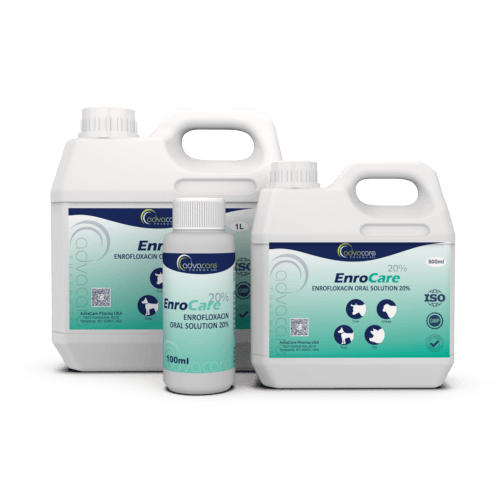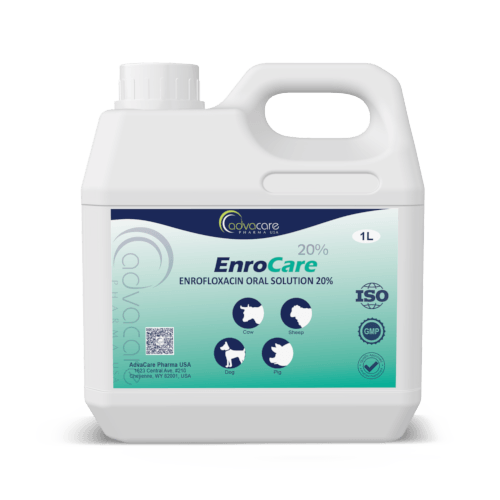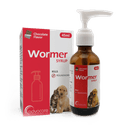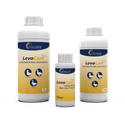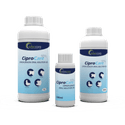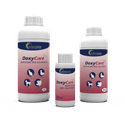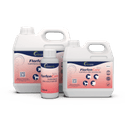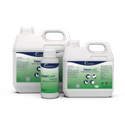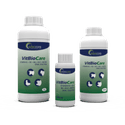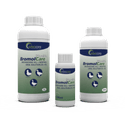- Home›
- Veterinary Pharmaceuticals›
- Veterinary Solutions and Suspensions›
- Veterinary Oral Solutions›
- Enrofloxacin Oral Solution
Enrofloxacin Oral Solution
Dosage
Packaging
What is Enrofloxacin?
Active Ingredients: Enrofloxacin
Enrofloxacin Oral Solution is an antibiotic drug that is used to treat susceptible bacterial infections in dogs, cows, poultry, rabbits, sheep, and pigs. It is often used for the treatment of skin and ear infections, urinary infections, and respiratory infections in cattle, swine, and poultry.
Enrofloxacin belongs to the family of medicines called fluoroquinolone antibiotics. Enrofloxacin inhibits bacterial DNA gyrase and topoisomerase IV, not RNA synthesis. Enrofloxacin displays bactericidal activity against a wide range of bacteria, including Staphylococcus, Escherichia coli, Proteus, and Klebsiella.
The bioavailability of this drug after oral administration depends on whether the animal is monogastric or polygastric. It varies from 10% to 80%. The bioavailability also depends if the animal is fed or fasted and depends on the presence of ions. It is because a complex forms between cation and fluoroquinolone and cannot permeate the digestive barrier.
This drug is metabolized into ciprofloxacin in most species, which is an active metabolite. Other metabolites also exist but they do not have antimicrobial effects. Only in poultry, the drug is not metabolized in ciprofloxacin. The first hepatic pass leads only to 7% metabolized and ciprofloxacin is more potent than enrofloxacin.
The distribution of this antibiotic depends on the drug’s free concentration and the strength of the binding. In some animals, this drug is less bound to proteins. The elimination half-life in pigs is around 26 hours. For poultry, the clearance of ciprofloxacin is five times higher than enrofloxacin’s clearance and the enrofloxacin clearance is lower than for other species. The drug is eliminated mainly through urine. Lactation also influences the clearance of the drug also.
It is important to note Enrofloxacin Oral Solution is for veterinary purposes only.
This drug can also be found in the form of injection, soluble powder, and tablets.
Enrofloxacin Oral Solution is a GMP-certified product that has been manufactured by AdvaCare. This medication is a part of our extensive catalog of medical supplies available for exportation. Our production facilities are located in China, India, and the USA.
Why are we a quality Enrofloxacin manufacturer?
AdvaCare Pharma, an American company, is a quality manufacturer of Enrofloxacin Oral Solution for veterinary use. We are committed to the manufacture and global distribution of over 250 GMP-certified veterinary medicines, including 70+ oral liquid formulations.
As a trusted Enrofloxacin manufacturer, our approach to supply chain management is systematic and data-driven. We provide unparalleled support to our veterinary distributors, assisting with document and product registration, supply chain coordination and market share growth.
Uses
What is Enrofloxacin used for?
It is used to treat respiratory infections, skin infections, and urinary tract infections.
What animals can be treated with Enrofloxacin Oral Solution?
It is recommended for dogs, rabbits, poultry, and livestock such as cows, sheep, and pigs.
How is Enrofloxacin Oral Solution used?
This medicine has been manufactured as a solution, which is intended to be diluted and administered orally. It is typically added to drinking water.
Why is Enrofloxacin Oral Solution better than the other forms of the drug?
Studies show that Enrofloxacin, when administered orally to sheep has a prolonged half-life and a high oral bioavailability. The research shows that 10 mg/kg, q 24 h, was sufficient to achieve a plasma concentration of 8 to 10 times the minimum inhibitory concentration (MIC) of any microorganism.
How does Enrofloxacin Oral Solution help animals?
It helps by inhibiting the bacterial DNA gyrase and topoisomerase IV, enzymes essential for DNA replication, transcription, repair, and recombination. This mechanism leads to cell death and this antibiotic has a bactericidal effect. It is efficient in treating both gram-negative and gram-positive bacteria depending on the susceptibility of it. It can be used for various urinary, respiratory, gastrointestinal, systemic, and reproductive tract infections.
Is only Enrofloxacin Oral Solution enough to treat a certain bacterial infection?
It depends on the severity of the issue. In some mild cases, this antibiotic alone can help in the treatment. But antibiotics should be taken concomitantly with probiotics to avoid gastrointestinal side effects like diarrhea and stomach upset. Other vitamins and drugs might be recommended for the animals based on the current health condition they have. Owners should consult with a veterinarian in order to determine the treatment process of the animal.
Can Enrofloxacin Oral Solution be given to pregnant animals?
This antibiotic can be used during pregnancy in animals only if the benefits outweigh the risks and if the veterinarian recommends so. It is because this drug can lead to problems with articular cartilage and can affect young puppies. Studies on pregnant mares show that this drug does not result in macroscopic or microscopic lesions in fetuses. This drug should not be given to pregnant or lactating animals that suffer from conditions affecting the central nervous system (CNS).
What should be done if a dose of Enrofloxacin Oral Solution is missed?
Administer the medication as soon as possible. If it is close to the time for the next scheduled dose, skip the missed dose and continue with the regular schedule. If multiple doses are missed, contact a veterinarian. Antibiotics need to be taken at specific and previously determined time schedules to avoid side effects.
Can Enrofloxacin Oral Solution help in the treatment process of viral diseases?
Viral diseases are not cured with antibiotics. For treating viral diseases, antiviral drugs, vitamins, and supplements can help. Very often, viral diseases can be complicated, and this can lead to secondary bacterial infections. The immune system of affected animals is low, and if there is a bacterial presence, this antibiotic may assist in the entire treatment process. The veterinarian must perform an antibiogram test to determine whether this antibiotic can help in the treatment.
How should Enrofloxacin Oral Solution be stored?
This medication should be stored in a dark, dry location under 30°C. Keep the bottle tightly sealed when not in use.
Is there a withdrawal period after treatment with Enrofloxacin?
The withdrawal time is 5-9 days for broiler chickens. The exact duration will depend on local regulations and specific usage guidelines.
Dosage
How much Enrofloxacin Oral Solution should be given to cows?
The usual dose is 2.5-5mg/kg, given once per day.
How much Enrofloxacin Oral Solution should be given to poultry?
The usual dose is 10mg. The duration of treatment is 3-10 days.
Refer to a veterinary doctor or pharmacist for guidelines on dosage.
Side Effects
As with all pharmaceuticals, some unwanted effects can occur from the use of Enrofloxacin Oral Solution.
Gastrointestinal effects may occur at higher doses. Serious side effects may include:
- allergic reaction
- uncoordinated walking
- seizures
- depression
- lethargy
- urinary crystals
- vision changes in cats
For a comprehensive list of all possible side effects of this medication, consult a veterinarian.
Precautions
Do NOT use Enrofloxacin Oral Solution for an animal that:
- has a known allergy or hypersensitivity to any of the ingredients.
- is dehydrated.
- is a small or medium breed dog under 8 months of age, or a large breed dog that has not finished its rapid-growth phase.
- is a cat with kidney disease.
Treatment with this drug should be administered with caution if an animal:
- is pregnant or lactating.
- has kidney or liver disease.
- has a seizure disorder.
There are many known interactions between enrofloxacin and other drugs, including antacids, antibiotics, corticosteroids, iron, zinc, levothyroxine, mycophenolate mofetil, methotrexate, nitrofurantoin, probenecid, quinidine, sildenafil, sucralfate, theophylline, and warfarin.
This drug may affect the results of a liver enzyme blood work test. It can also lead to abnormalities of the joint cartilage in young and growing animals.
The animals should be monitored for adverse effects and to observe whether the medication is working. If owners do not notice any improvement after a certain time period, they should contact veterinarians.
This drug should not be used for prophylaxis because it might lead to resistance or cross-resistance to fluoroquinolones.
This drug should be kept in a cool and dry place.
What are the most common animals Enrofloxacin Oral Solution is used for?
Enrofloxacin Oral Solution is mainly used for treating infections caused by susceptible microorganisms. This includes treatment of the following:
- Campylobacter
- E. coli
- Haemophilus
- Mycoplasma
- Pasteurella
- Salmonella
Ruminant Animals Bacterial Infections
Cattle can be treated with this antibiotic for various bacterial infections. It is very often used for treating acute clinical mastitis caused by E. coli. It is also used for treating Anaplasma marginale and pneumonic pasteurellosis. Bovine respiratory disease, when caused by susceptible bacteria can also be treated with this antibiotic.
Dog Bacterial Infections
This antibiotic is used for treating various respiratory, intestinal, urinary, and skin infections. This includes treating bacterial prostatitis, meningoencephalitis, osteomyelitis, and arthritis. Veterinarians should perform an antibiogram test before using this antibiotic to determine if the bacteria are susceptible to the drug.
Pig Bacterial Infections
Pigs can be treated with this drug in cases of swine respiratory disease (SRD), associated with Actinobacillus pleuropneumonia, Pasteurella multocida, Haemophilus parasuis, Streptococcus suis, Bordetella bronchiseptica, and Mycoplasma hyopneumoniae. It can also be used for the control of colibacillosis in groups or pens of weaned pigs where colibacillosis associated with Escherichia coli has been diagnosed.
Poultry Bacterial Infections
In poultry, this drug can be used for treating E. coli, Pasteurella multocida, Mycoplasma gallisepticum, Salmonella enterica, Colibacillosis, and Ornithobacterium rhinotracheale.
Veterinarians should decide whether the drug is appropriate for the animal’s current health condition.

You might be interested in...
Why AdvaCare Pharma?
As an industry leader, we are aware of our responsibility to provide affordable and sustainable solutions to improve healthcare worldwide.
